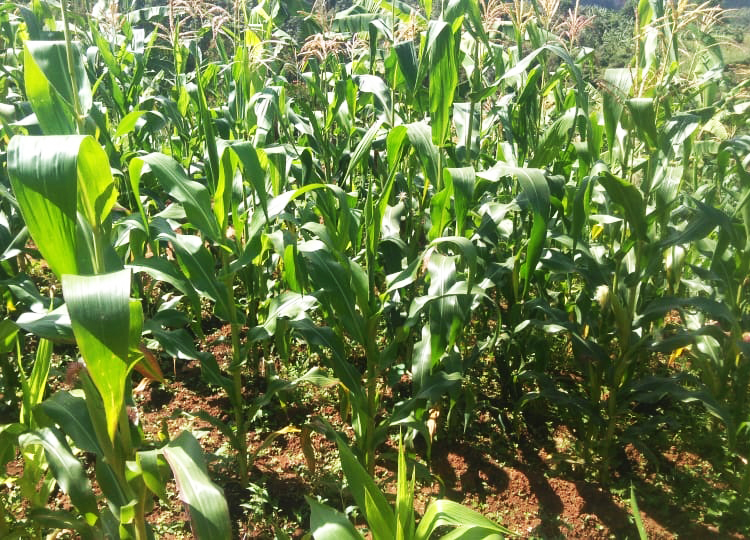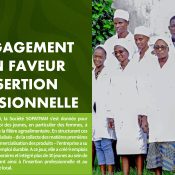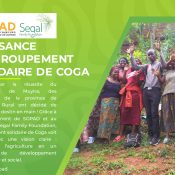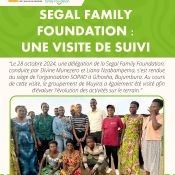
COPAD: A glimmer of hope for women's agricultural groups
The courageous women of Gihanga and Buringa have organized themselves into a group of 12 women to promote sustainable agricultural activities. Embracing solidarity and collaborative work, these brave women cultivate a model field of 3,600 m2 in Gihanga and another model field of 7,200 m2 in Buringa, where they grow maize and other cereals such as soybeans. From the model field, they learn agricultural techniques that become very useful when applied in their respective fields. In addition to these fields, thanks to the COPAD Cooperative, the women's group in Gihanga has pooled their efforts to cultivate a communal field covering an area of 3,600 m2 in a space commonly known as "Igito."
The main reason for pooling their efforts is the entrepreneurial spirit that drives the women of Gihanga. Most regions in Burundi, particularly the province of Bubanza, have been heavily affected by the socio-political crisis, leading to social disruptions in households, which consequently adopted the theory of separate work. The women in the agricultural group in Gihanga have strongly confronted this challenge by forming a team to combat poverty. These women hope to establish a savings fund soon, enabling them to finance their own short and medium-term projects. Additionally, the group provides mutual support, in addition to the financial profits they derive from it.
Maintaining a mutually beneficial solidarity among the members of the group.

From a social and community perspective, the formation of women's groups in Gihanga has prevented the exclusion of certain women who considered themselves poor. The courage to join others has helped cut the string of inferiority complex that entangled some members of the community. Later, they will understand that, for development, one needs not only the support of others but also openness to new horizons. For some, the group has been an opportunity to obtain the necessary resources to pay for the children's school fees, preventing them from dropping out of school. For others, it has been a unique opportunity for livelihood because, with the group, working in the fields of others has almost become a regular activity.
Due to high population growth, land is becoming increasingly scarce, and the women of Gihanga are not spared. It is often not easy for these women to rent and cultivate a field individually. The group, therefore, provides its members with the facility to collectively rent and cultivate fields, which becomes a profitable advantage for women who were not able to do so individually before. Additionally, the group enables its members to save money and increases their credibility in the community.
Jeanne d’Arc Nibigira, a member, states that when acting as a group, they easily receive inputs, sometimes even on credit, which is difficult or impossible when working individually. "For us, the group is a blessing because, before, our husbands did not consider us. We were forced to stay at home all day doing household chores, without any financial contribution. But now, when we return home from work, we have a say," adds Ruth Nsengiyumva.
A path towards sustainable development

In view of all these advantages and with the aim of ensuring the empowerment of the beneficiaries, the Cooperative for the Development of Sustainable Agriculture - COPAD has taken the initiative to support these women in pushing their willingness further. These women are committed to working collectively and managing the cultivation of the cooperative's model fields to learn agricultural techniques to apply at home on one hand, and on the other hand, to earn money. The work performed by these women responsible for the cooperative's model fields is remunerated at a rate of 6,500 BIF per day. The amounts received as compensation serve several purposes, and a portion is saved for the group's account.
Apart from the wages received, every year the cooperative rents a field for the benefit of the women beneficiaries where they grow crops to strengthen their fund. In addition to the expected monetary value from the field's production, it helps keep these women united and enhances their entrepreneurial vision.
The yield reports from the cooperative's fields give hope for a better future for these women. Community development will involve the establishment of pilot fields in other regions and the promotion of sustainable agriculture through awareness campaigns. This project has received positive responses from the groups of young girls and women farmers in Gihanga and Buringa regarding collaborative work strategies and the benefits of a savings fund.
The editorial, ID




